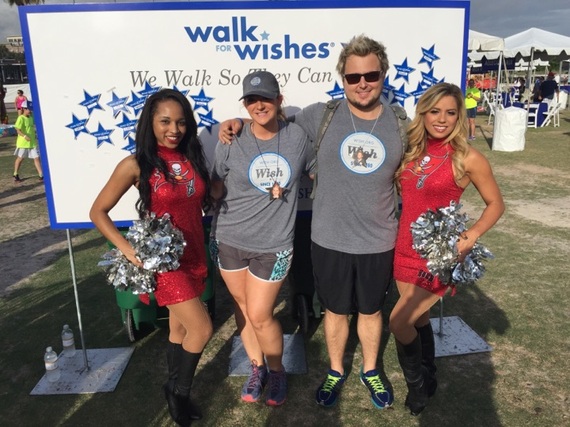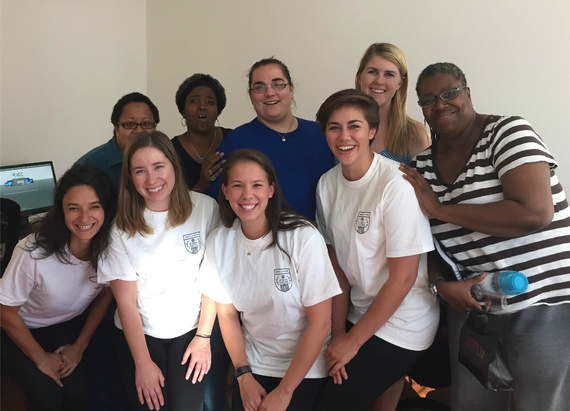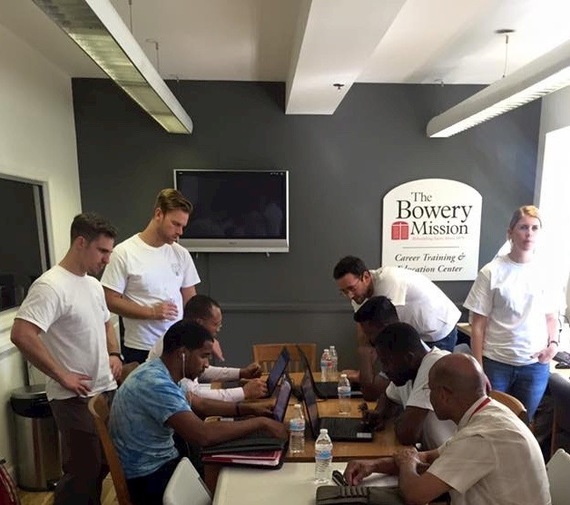Last November, I attended a Millennials Summit at Thompson Reuters. One discussion particularly resonated with me: More of today's workforce is seeking careers with social impact. It's the reason I decided to join Watertree Health earlier that month. The company's mission is to make health care more accessible to all people in America -- to improve their health. They have programs with key health-related nonprofits that provide an ongoing revenue stream to these organizations. In 2015 alone, Watertree Health saved cardholders $84 million on prescription costs, raised enough money to provide almost one million meals to 15 local food bank partners and donated $530,000 to Make-A-Wish. As a member of the team, I not only assist in growing the company, but I participate in its goal to expand its philanthropic efforts. Watertree Health cultivates a culture of helping, and social responsibility is ingrained in the corporate DNA.
 Watertree Health's Power Couple, Eric and Trina Burgess Support Walk for Wishes
Watertree Health's Power Couple, Eric and Trina Burgess Support Walk for Wishes
As Grovo CEO and Cofounder, Jeff Fernandez wrote in Forbes recently, "Paycheck Or Purpose? Today's Employees Demand Both". Last year, I first co-wrote with Jeff about "Digital Skills Urgently Needed to Bridge Digital Literacy Gap". At the time, his company had partnered with Capital One to announce the Future Edge Digital Literacy Challenge at the Clinton Global Initiative America. An initiative designed to bring free digital literacy education to the masses, it empowers people with the skills needed to compete for the millions of secure, well-paying middle-skill jobs that today's employers are actively looking to fill.
More recently, Grovo was named to the coveted CNN Upstart 30 "Idealists" list, and also Icreon consultants' "Top 10 Startups To Work for in 2015" list, along with Slack, Birchbox and Venmo. On January 26th, it announced $40M in Series C funding led by existing investor Accel with participation from Greg Waldorf, Costanoa Venture Capital, SoftTech VC and Vayner Capital. Jeff's company solves learning & development (L&D) problems for such brands as Major League Baseball, Equinox, Whole Foods, Chevron, the Kansas City Chiefs and DDB.
I interviewed Jeff further about his thoughts on social impact.
Why are millennials particularly interested in purpose at their jobs today?
Millennials were the first generation to grow up with the Internet and technology deeply embedded into their lives. Because of that enormous and unprecedented access to information, they have an acute sensitivity to injustice and a deep desire to make a difference. Their ability to understand and know what's going on globally is much higher than any previous generation. At the same time, they grew up in an era where making your voice heard is as simple as clicking "tweet." They've watched ordinary people spark movements and topple brands. Together, those forces drive Millennials to seek out jobs that prioritize people and purpose alongside their products and profits. Simply put, they want and expect to be able to make a difference.
Which companies are doing particularly well at balancing purpose and paycheck?
When most people hear "purpose-driven" work, they immediately think of companies like Tom's, Warby Parker, or FEED. The truth is, any company can give their people greater purpose. It's about having an authentic, clearly stated mission that every employee can understand and rally behind. That shared vision builds team camaraderie and inspires people to work at a really high level. Great managers and leaders show people how their work is connected to that bigger picture.
How can companies cultivate philanthropy in their organizations?
It's great to appoint someone internally to be point person on a philanthropy program, even if you're a smaller organization. It can start small, with actions like holiday toy and coat drives, and grow from there into bigger cross-company and partner initiatives. Empower your people to determine how they want to come together make an impact.
Starting Grovo for Good, Grovo's philanthropic arm, was always something I wanted to do, and our employees were big proponents of it. Once you have a team that's excited to give back, then your company's leadership needs to commit by pledging regular hours or monetary support for this sort of participation. Please watch our Grovo for Good video.
How can one company who seeks to make social impact differentiate itself from others?
Authenticity. You have to do it your own way. Along the journey, you have to empower your people, connect it to your company's mission, and just be true to it. Ultimately, authenticity is the differentiator between the socially-conscious programs that stick and those that falter.
What are your thoughts on the socially-minded i(x) Investments, co-founded by 32 year old Howard Warren Buffett, grandson of Warren E. Buffett?
In the past, there was a much bigger focus on the idea of separate social responsibility initiatives that companies sponsored or bought into. Today, as in this case, socially-minded investments are more integrated within core business models and strategies. It makes sense for Buffett to leverage his brand name and inherent competitive advantages for social good. I applaud the effort, and wish him the best of luck.
What can nonprofits learn from the for-profit world? Vice versa?
Nonprofits succeed when they are performance and goal-oriented, just like the for-profit world. Doing good and making a difference can and should be measured and meticulously strategized. Many nonprofits already have a firm grasp of this, though. For-profits stand to benefit when they instill a solid sense of purpose in their workforce, something that nonprofits excel at. They can learn that you don't need exorbitant paychecks and perks to have a passionate, capable group of people driving your business forward.
No matter what company you are at, cultivating a strong sense of culture and team dynamic is key to attracting amazing, motivated people that do their best work for you.
What are the most common L&D problems for companies?
The biggest hurdle for companies is getting employees to complete any sort of learning in the first place. Training has a perception problem. People expect to be confronted with boring, irrelevant material that's largely compliance driven and unnecessary. Grovo is working to fix this through smarter learning programs that match today's rapidly changing workplace, delivered in a way that's fast and fun. It's learning that people love and can actually connect with.
The second biggest learning problem many companies face is a lack of quality managerial and leadership training. Companies are really after behavioral change, but they often don't treat it that way. Developing great managers isn't about imparting knowledge and competencies, but rather instilling the right habits. It's a pain point that we feel too, which is why action-oriented learning is a big part of our learning approach. Internally, delivering exceptional training for our managers is a big priority for us this year.
How does Grovo attract socially-minded exceptional talent?
I think it starts with clarity of purpose, mission and values. We are hyper-selective about finding people who are not only competent to do the job, but also add to our culture and are passionate about our purpose. In order to that, we aggressively pursue a large funnel of talent so we're able to meet a wide spectrum of candidates. We often find people who fit the job description, but finding the right cultural fit is the harder piece of the equation.
Are the days of ping pong, foosball tables and beer Fridays gone?
I sure hope not! Provided that we perform, we'll keep those days alive and well. However, employee perks like this are "nice-to-haves", not "must haves". These things aren't culture, and it's dangerous to think that way. You're much better off de-emphasizing perks and instead focusing on your overall culture. That being said, playing ping pong is a lot of fun. Just understand its purpose. In and of itself, it's not what drives the company forward.


